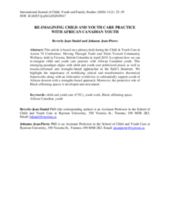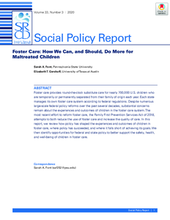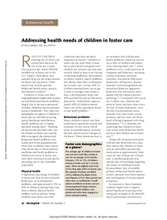Displaying 541 - 550 of 2221
In this chapter of Reforming Child Welfare in the Post-Soviet Space, the authors analyse how children in foster care in Russia perceive their experiences in foster families through the use of biographies.
This report provides the detailed findings from a survey on the proportion of youth in foster care in New York City who are LGBTQAI+ and differences in their experiences compared to those of youth who are not LGBTQAI+.
This article explores how we can re-imagine child and youth care practice with African Canadian youth.
In this report, the authors review how policy has shaped the experiences and outcomes of children in foster care in the U.S., where policy has succeeded, and where it falls short of achieving its goals. The authors then identify opportunities for U.S. federal and state policy to better support the safety, health, and well-being of children in foster care.
This report was developed with extensive input from LGBTQ+ young people currently or formerly in foster care, LGBTQ+ young people currently or formerly experiencing homelessness, and direct service workers. It identifies how the pandemic is amplifying some of the risks for LGBTQ+ youth in child welfare systems and propose practices to mitigate them.
This book prepares future child welfare professionals to tackle the complex and challenging work associated with responding to child maltreatment.
This article takes a look at physical and behavioral health problems in children and teens in foster care in the U.S. and offers information and tips for providing care to this vulnerable population.
This article describes the system of training and support of foster carers and adoptive parents in Estonia.
In partnership with the University of Houston Graduate College of Social Work, the upEND movement works to create a society in which the forcible separation of children from their families is no longer an acceptable solution for families in need.
This volume examines existing research documenting racial disproportionality and disparities in child welfare systems, the underlying factors that contribute to these phenomena and the harms that result at both the individual and community levels.





